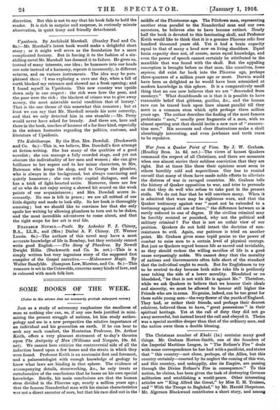War from a Quaker Point of View. By J. W.
Graham. (Headley Bros. Is. 6d. net.)—The views of honest Quakers command the respect of all Christians, and there are moments when one almost envies their sublime conviction that they are right. But at times like these their opinions must seem to others horribly cold and supercilious. One has to remind oneself that many of them have made noble efforts to alleviate the distress of war in ravaged countries. Mr. Graham tells the history of Quaker opposition to war, and tries to persuade us that they do well who refuse to take part in the present strife. We do not fear that he will convince many. When it is admitted that wars may be righteous wars, and that the Quaker testimony against war " must not be extended to a testimony against all use of force," the difference between us is surely reduced to one of degree. If the civilian criminal may be forcibly resisted or punished, why not the political and military criminal ? For that is not an unfair view of our position. Quakers do not hold intact the doctrine of non- resistance to evil. Again, our patience is tried on another point. Mr. Graham gives some tepid praise to the power of combat to raise men to a certain level of physical courage. But just as Quakers regard human life as sacred and inviolable, so they should reckon the willing sacrifice of life in a good cause surpassingly noble. We cannot deny that the morality of nations and Governments often falls short of the standard that the individual ought to reach. But for Englishmen to try to be neutral to-day because both sides take life is perilously near taking the side of a lower morality. Bloodshed or no bloodshed, "he that is not with Me is against Me." Therefore, while we ask Quakers to believe that we honour their ideals and sincerity, we must be allowed to honour still higher the Friends who are in arms. No praise, indeed, can be too great for these noble young men—the very flower of the youth of England. They had, or rather their friends, and perhaps their dearest relatives, believed them to have, " great possessions " in their spiritual heritage. Yet at the call of duty they did not go away sorrowful, but instead heard the call and obeyed it. Theirs was a special sacrifice deeper than that of the ordinary man, and the nation owes them a double blessing.










































 Previous page
Previous page